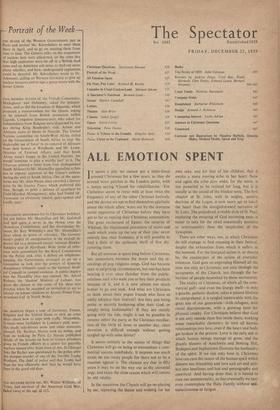Portrait of the Week— THE HEADS of the Western Governments,
met in Paris and invited Mr. Khrushchev to meet them there in April, and to go on meeting them from time to time. The Geneva talks on the suspension of nuclear tests were adjourned, on the same day that high explosives were let off in a British lead mine and an American salt mine, to find out more about whether, and how, underground explosions could be detected. Mr. Khrushchev wrote to Dr. Adenauer, calling on Western Germany to give up nuclear weapons and to sign a peace treaty with the Soviet Union: TWO MEMBER STATES of the French Community, Madagascar and Dahomey. asked for indepen- dence, and so did the kingdom of Buganda, which prepared a memorandum for the Queen, asking to be released from British protection within Uganda. Congolese demonstrators who asked for independence from Belgium were dispersed by tear gas during King Baudouin's visit. Asians and Africans came to blows in Nairobi. The United Nations committee on South-West Africa called on the Government of South Africa to stop 'the deplorable use of force' in its removal of Africans from their homes at Windhoek, and Mr. Louw, Minister of External Affairs, said that South Africa wasn't happy in the United Nations, but would 'continue to play a worthy part' in it. The Observer printed a letter from four distinguished South Africans to Mr. Macmillhn appealing to hini not to express approval of the Union's policies during his visit to South Africa. One of the signa- tories was Mr. Alan Paton. once awarded a literary prize by the Sunday Times, which preferred this time, though, to print a defence of apartheid by Field-Marshal Montgomery, who had found Dr. Verwoerd 'an obviously sincere, quiet-spoken and kindly man.'
PARLIAMENT ADJOURNED for its Christmas holidays, but not before Mr. Macmillan and Mr. Gaitskell had had quite a set-to in the House over the Monckton Commission, and the discrepancy be- tween Sir Roy Welensky's and Mr. Macmillan's ideas about its terms of reference. The Govern- ment's policy of amalgamation in the aircraft in- dustry led to a proposed merger between Hawker Siddeley and de Havilland.. Wide terms of refer- ence were announced for the Royal Commission on the Police and, after a debate on telephone- tapping, the Government arranged to set up a committee to look into th,e powers of domestic disciplinary tribunals (such as the General Medi- cal Council) to compel evidence. A public inquiry into the Piccadilly plan was opened. Mr. Alfred Robens, the 'shadow' Minister of Labour, was given the chance to put some of his ideas into Practice when he accepted an invitation to act as adviser on labour relations to Atomic Power Con- structions Ltd in North Wales.
MR. MARPLES began a tour of Germany, France, Belgium and the United States to pick up some Ideas about how to cope with traffic. Meanwhile, U-turns were forbidden in London's pink zone : this made taxi-drivers cross and other motorists Pleased. Dr. Barbara Moore took no notice, and kept on walking. In Paris Le Monde published details of the lessons on how to torture prisoiters given to French officers in a centre for guerrilla Warfare named after Saint Joan of Arc. In Chicago Jake the Barber was questioned by the police after the shotgun murder of one of the Terrible Touhy Brothers. The chief of police said that Touhy had been far less efficiently shot than he would have been in the good old days.
OLD SOLDIERS NEVER DIE. Mr. Waller Williams, of Texas, last survivor of the American Civil War, faded away at the age of 117.


























 Previous page
Previous page